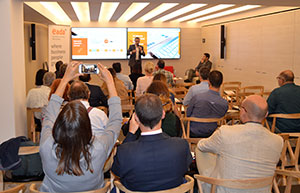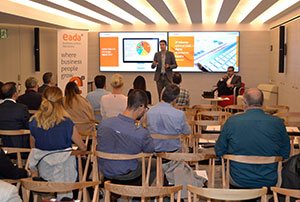EADA and RocaSalvatella present the ‘II Digital Report for Managers’
General management leads the digital transformation of companies
 The digital transformation of companies is being progressively led by general management. This is the main conclusion drawn from the II Digital Report for Managers presented by EADA and RocaSalvatella, based on a survey of over 600 managers from different sectors and companies. 37% of the managers surveyed believe this to be the case, followed by the IT department (20%) and Marketing (17%).
The digital transformation of companies is being progressively led by general management. This is the main conclusion drawn from the II Digital Report for Managers presented by EADA and RocaSalvatella, based on a survey of over 600 managers from different sectors and companies. 37% of the managers surveyed believe this to be the case, followed by the IT department (20%) and Marketing (17%).
These results represent a change in relation to the findings of the first report, in 2015. Back then, companies’ Digital Marketing departments were leading this transformation, followed by Business & Technology (ICT) with 27%.
In this sense, according to Ramon Costa, director of the study and the EADA Digital Transformation Management Programme (Spanish) “we can see that digital transformation is already on the management committee agenda within organisations, as the impact of the intensive use of technologies in company processes, business affairs and relations has already been assimilated.” However, he concludes that “this does not mean managers are trained to transfer these digital technologies and the change involved for the corporate strategy”.
In turn, Gerard Vélez, RocaSalvatella Digital Transformation Director, notes that “beyond affecting the Marketing, ICT or Communications Departments, companies have learned that digital affairs have an impact on their strategies and this may involve redesigning their business model”.
In-company ICT use
 The report therefore places special emphasis on managers’ levels of digital maturity. Based on the surveys conducted, the study reveals that managers get a pass in this area, with an average score of 6.1. Specifically, they all got an acceptable grade in digital skills applied to their daily jobs, mainly operational functions, (7.1) and in team work (5.5). However, they fail in the application of these skills throughout the organisation (4.9) and in their operating environment (4.6). Consequently, the more operational skills are more highly developed, something that doesn’t happen with more strategically applied skills.
The report therefore places special emphasis on managers’ levels of digital maturity. Based on the surveys conducted, the study reveals that managers get a pass in this area, with an average score of 6.1. Specifically, they all got an acceptable grade in digital skills applied to their daily jobs, mainly operational functions, (7.1) and in team work (5.5). However, they fail in the application of these skills throughout the organisation (4.9) and in their operating environment (4.6). Consequently, the more operational skills are more highly developed, something that doesn’t happen with more strategically applied skills.
Furthermore, the report shows that companies are gradually moving towards a more intensive use of IT as a competitive tool. 78% of executives - a 4% increase compared to 2015 - see technology use in their company as a competitive tool and already make average or high use thereof, against 22% making a low or zero use of the technology.
Most noteworthy changes
The study also posed the following questions:
• What are we doing well? Applying digital technologies enabling us to work from any location and access our information (emails, documents, agenda, calendar).
• Where are we falling short? Also in the application of the technologies, in this case the most recent such as the blockchain, the Internet of Things, Virtual and Augmented Reality, etc.
• How have we improved compared to 2015? In the use of digital tools to promote creativity and innovation.
• Where have we gone backwards? In the use of different sources for news. We are happy with an app that condenses several sources, and lose out in terms of information wealth to gain comfort.
